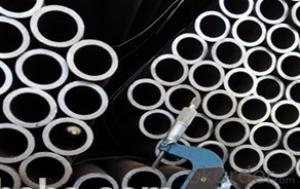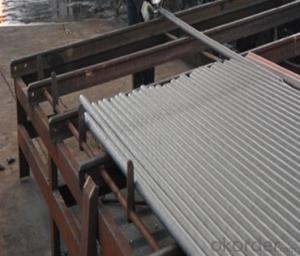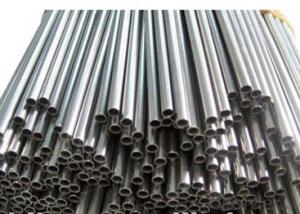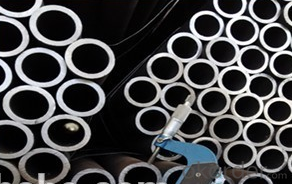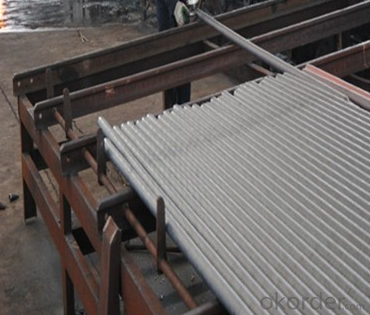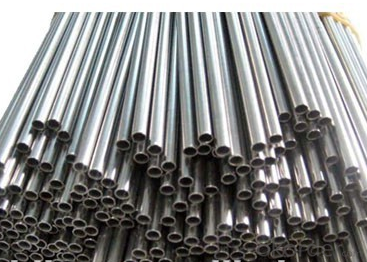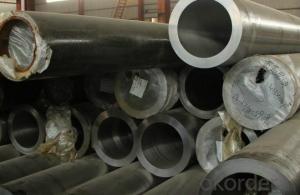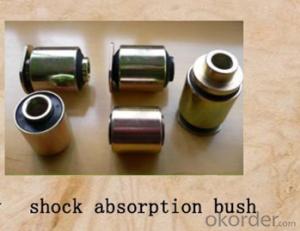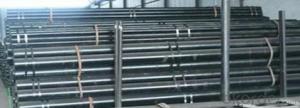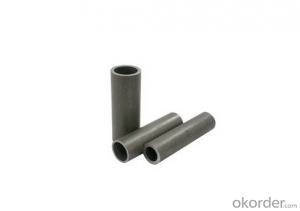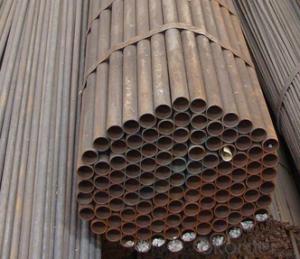1020 Carbon Seamless Steel Pipe 20 CNBM
- Loading Port:
- Qingdao
- Payment Terms:
- TT OR LC
- Min Order Qty:
- 10 pc
- Supply Capability:
- 30 pc/month
OKorder Service Pledge
OKorder Financial Service
You Might Also Like
Quick Details
| Thickness: | 1 - 40 mm | Section Shape: | Round | Outer Diameter: | 21.3 - 609.6 mm |
| Secondary Or Not: | Non-secondary | Application: | Fluid Pipe | ||
| Technique: | Hot Rolled | Certification: | BV | Surface Treatment: | Other |
| Special Pipe: | Thick Wall Pipe | Alloy Or Not: | Non-alloy | Standard: | API 5L,API |
Packaging & Delivery
| Packaging Detail: | Standard seaworthy export packing with steel strip or with plastic clothe, or as requests from the coustomer. |
| Delivery Detail: | 7-25 days after receiveved the deposit |
Specifications
Seamless Steel Pipe
Standard:API ASTM DIN
Size:OD:21.3mm-609.6mm
WT:1mm-40mm
Mechanical properties
standard | grade | Tensile strength(MPA) | yield strength(MPA) |
ASTM A106 | A | ≥330 | ≥205 |
B | ≥415 | ≥240 | |
C | ≥485 | ≥275 |
Chemical ingredients
standard | grade | Chemical ingredients | |||||||||
C | Si | Mn | P | S | Cr | Mo | Cu | Ni | V | ||
ASTM A106 | A | ≤0.25 | ≥0.10 | 0.27~0.93 | ≤0.035 | ≤0.035 | ≤0.40 | ≤0.15 | ≤0.40 | ≤0.40 | ≤0.08 |
B | ≤0.30 | ≥0.10 | 0.29~1.06 | ≤0.035 | ≤0.035 | ≤0.40 | ≤0.15 | ≤0.40 | ≤0.40 | ≤0.08 | |
C | ≤0.35 | ≥0.10 | 0.29~1.06 | ≤0.35 | ≤0.35 | ≤0.40 | ≤0.15 | ≤0.40 | ≤0.40 | ≤0.08 | |
| Company Name | Tianjin Xinlianxin | ||
| Business Type | Manufacturer and Exporter | ||
| Product | steel pipe | ||
| Main Products and Standards | |||
| product name | Specification Range | steel Grade | Executive Standard |
| Structure Pipe | 20mm-820mm 1/2"-32" | 10,20,35,45,16Mn,A53AB | GB/T8162-1999,ASTM A53-98,ASTM500-98,ASTM 500-98,JISG3441-1998,JISG3444-1994 |
| Pipe for Liquid Transportation | 20mm-820mm 1/2"-33" | 10,20,Q345(16Mn),A53AB,A192,SGP | GB/T8163-1999,ASTM A53-98,ASTM A192,JISG3452-1997 |
| Boiler Pipe | 20mm-820mm 1/2"-35" | 20,20G,A179,A106B,A192,ST37.0,ST44.0,ST35.8,ST45.8,Gr320 | GB3087-1999,GB5310-1995,ASTM A106,ASTM A179,ASTM A192,DIN-1629-1984,DIN17175,BS3059.1-1987 |
| 1 | Product | seamless steel pipe | |
| 2 | Standard | U.S.A. | ASTM A53/A106/A178/A179/A192/A210/A213/ A333/A335/A283/A135/A214/A315/A500/A501/A519/A161/A334 API 5L/5CT |
| Japan | JIS G3452/G3454/G3456/G3457/G3458/G3460/3461/3462/3464 | ||
| German | DIN 1626/17175/1629-4/2448/2391/17200 SEW680 | ||
| Britain | BS 1387/1600/1717/1640/3601/3602/3059/1775 | ||
| Russia | GOST 8732/8731/3183 | ||
| China | GB/T8162/T8163 GB5310/6579/9948 | ||
| 3 | Material Grade | U.S.A. | Gr. B/Gr.A/A179/A192/A-1/T11/T12/T22/P1/FP1/T5/4140/4130 |
| Japan | STPG38,STB30,STS38,STB33,STB42,STS49, STBA23,STPA25,STPA23,STBA20 | ||
| German | ST33,ST37,ST35,ST35.8,ST45,ST52,15Mo3, 13CrMo44, 1.0309, 1.0305, 1.0405 | ||
| Britain | Low, Medium, high | ||
| Russia | 10, 20, 35, 45, 20X | ||
| China | 10#, 20#, 16Mn, 20G, 15MoG, 15CrMo, 30CrMo, 42Crmo, 27SiMn, 20CrMo | ||
| 4 | Out Diameter | 21.3mm-609.6mm | |
| 5 | Wall Thickness | 2.31mm-40mm | |
| 6 | Length | As per customers' requirements | |
| 7 | Protection | Plastic caps/ Wooden case | |
| 8 | Surface | Black painting/varnished surface,anti-corrosion oil, galvanized or as per required by customer | |
- Q: What is the impact toughness of steel pipes?
- The ability of steel pipes to withstand sudden or high-velocity impacts without fracturing or breaking is referred to as their impact toughness. This property measures the material's resistance to cracking when subjected to dynamic loading conditions. The impact toughness of steel pipes is highly significant as it determines their capacity to endure accidental impacts or external forces during transportation, installation, and operation. To evaluate the impact toughness of steel pipes, standardized tests such as the Charpy V-notch test or the Izod test are commonly utilized. These tests involve striking a notched sample of the steel pipe with a pendulum or a falling weight and measuring the amount of energy absorbed by the material until it fractures. The impact toughness is then calculated based on this energy absorption. A high impact toughness is desirable in steel pipes as it signifies a greater ability to absorb energy and resist fracture, making them more resilient to sudden impacts or loading conditions. This characteristic is particularly crucial in applications where steel pipes are exposed to high-stress environments, such as in oil and gas pipelines, automotive components, or structural applications. Several factors can influence the impact toughness of steel pipes, including their chemical composition, heat treatment, and microstructure. For instance, alloying elements like manganese, chromium, and nickel can enhance the impact toughness by promoting the formation of fine-grained microstructures and preventing crack propagation. Similarly, appropriate heat treatment processes like quenching and tempering can optimize the material's microstructure and mechanical properties, thereby improving its impact toughness. In conclusion, the impact toughness of steel pipes is a vital property that determines their ability to withstand sudden or high-velocity impacts. It is evaluated through standardized tests and can be influenced by factors such as chemical composition, heat treatment, and microstructure. A high impact toughness is desirable in steel pipes to ensure their structural integrity and resistance to fracture when subjected to dynamic loading conditions.
- Q: Can steel pipes be used in extremely cold temperatures?
- Yes, steel pipes can be used in extremely cold temperatures. Steel is known for its strength and durability, making it suitable for various applications, including in extreme cold weather conditions. Steel pipes have a high resistance to low temperatures and can withstand the effects of freezing temperatures without losing their structural integrity. This makes them ideal for use in industries such as oil and gas, where they are exposed to sub-zero temperatures. Additionally, steel pipes can be insulated or coated to provide further protection against the cold and prevent any potential issues, such as freezing or cracking. Overall, steel pipes are a reliable choice for use in extremely cold temperatures.
- Q: What is the density of steel pipes?
- The density of steel pipes varies depending on their composition, but on average, the density of steel pipes is around 7.8 grams per cubic centimeter.
- Q: What are the common standards for coating and lining of steel pipes?
- The common standards for coating and lining of steel pipes are outlined by various organizations and regulatory bodies to ensure the durability, corrosion resistance, and overall quality of the pipes. Some of the widely recognized and used standards include: 1. American Society for Testing and Materials (ASTM): ASTM has developed numerous standards for coating and lining of steel pipes, such as ASTM A775/A775M for epoxy-coated reinforcing steel, ASTM A1064/A1064M for metallic-coated steel wire, and ASTM A1057/A1057M for fusion-bonded epoxy-coated steel reinforcement. 2. American Water Works Association (AWWA): AWWA has established several standards for coating and lining of steel pipes used in the water industry. Examples include AWWA C210 for liquid epoxy coating systems for the interior and exterior of steel water pipelines, and AWWA C213 for fusion-bonded epoxy coating for the interior and exterior of steel water pipelines. 3. National Association of Corrosion Engineers (NACE): NACE International develops standards and recommended practices for the corrosion control of steel pipes. NACE SP0169 provides guidelines for selection and application of coatings for underground or submerged steel pipelines, while NACE SP0198 offers recommendations for external coatings of steel pipelines. 4. ISO Standards: The International Organization for Standardization (ISO) has developed various standards related to coating and lining of steel pipes. ISO 21809-1 specifies the requirements for external coatings applied to buried or submerged pipelines, while ISO 21809-2 focuses on the internal coating and lining of such pipelines. These standards cover different aspects of the coating and lining process, including surface preparation, application methods, minimum coating thickness, adhesion, and quality control. Adhering to these standards ensures that steel pipes are properly protected against corrosion, abrasion, and other forms of deterioration, leading to longer service life and enhanced performance in various industries such as oil and gas, water supply, and infrastructure.
- Q: How are steel pipes used in the construction of tunnels?
- Steel pipes are commonly used in the construction of tunnels for various purposes, such as drainage systems, ventilation, and providing structural support. They are used to create efficient and durable drainage systems to manage water flow and prevent flooding in tunnels. Steel pipes are also used for ventilation systems, allowing fresh air to circulate and remove pollutants. Additionally, they can be employed to provide structural support, reinforcing the tunnel walls and ensuring stability and safety.
- Q: Can steel pipes be used for offshore applications?
- Steel pipes are suitable for offshore applications. They are commonly employed in offshore industries due to their durability, strength, and resistance to corrosion. In offshore settings, such as oil and gas exploration, drilling, production, and fluid and gas transportation, steel pipes are frequently necessary. These pipes are specifically designed to endure harsh and corrosive conditions found offshore, which include exposure to saltwater, extreme temperatures, and high pressure. Moreover, steel pipes can be manufactured to meet specific requirements for offshore projects, guaranteeing safety and dependability in terms of size, thickness, and material grade. In summary, steel pipes are a dependable and extensively utilized option for offshore applications.
- Q: How are steel pipes insulated?
- Steel pipes can be insulated using various methods such as applying insulation materials like foam or fiberglass wraps, using thermal tapes, or employing pre-insulated pipe systems where insulation is integrated into the pipe during manufacturing.
- Q: Can steel pipes be used for underground gas storage?
- Certainly! Underground gas storage can indeed utilize steel pipes. Steel pipes are frequently employed in the transportation and storage of diverse gas varieties, such as natural gas, owing to their robustness, longevity, and ability to resist corrosion. These pipes can endure substantial pressures and can be tailored to meet the specific prerequisites of subterranean gas storage installations. Furthermore, materials can be applied to the surfaces of steel pipes, either as a coating or lining, to bolster their resistance to corrosion and avert any possible leaks. Nevertheless, it is crucial to ensure that the correct safety protocols and regulations are adhered to during the construction and operation of underground gas storage facilities to prevent any potential perils or hazards.
- Q: How are steel pipes used in the construction of biomass power plants?
- Steel pipes are commonly used in the construction of biomass power plants for various purposes. They are used to transport and distribute water, steam, and other fluids within the plant, as well as to carry and contain biomass fuel, such as wood chips or agricultural waste. Steel pipes are also used for structural purposes, providing support for equipment and structures within the plant. Additionally, they are used for exhaust systems and ventilation, ensuring the safe release of gases and managing air circulation. Overall, steel pipes play a crucial role in the efficient and reliable operation of biomass power plants.
- Q: How are steel pipes used in the construction of power transmission lines?
- Steel pipes are commonly used in the construction of power transmission lines due to their exceptional strength, durability, and versatility. These pipes serve various purposes throughout the project, contributing to the overall efficiency and reliability of the power transmission system. One primary application of steel pipes in power transmission line construction is for the installation of transmission towers. These pipes are used as structural components to support the transmission lines and maintain their alignment. The high strength of steel ensures that the towers can withstand the weight of the transmission lines, as well as external forces such as wind and ice loads. Moreover, steel pipes offer excellent resistance against corrosion, which is crucial for the longevity of the transmission tower structures. In addition to tower construction, steel pipes are also utilized for the underground transmission lines. These pipes act as conduits for the cables, protecting them from external elements and potential damage. Steel pipes are particularly advantageous in this application due to their ability to resist soil movement, withstand high pressure, and provide a secure pathway for the power cables. Furthermore, the durability of steel ensures the integrity and longevity of the underground transmission lines, reducing maintenance requirements and enhancing the overall reliability of the power transmission system. Furthermore, steel pipes are used for the construction of foundations and anchors for transmission towers. These pipes are driven deep into the ground to provide stability and support to the towers. The inherent strength and rigidity of steel pipes make them ideal for this purpose, as they can withstand the heavy loads and ensure the stability of the transmission towers even in adverse weather conditions. Overall, steel pipes play a crucial role in the construction of power transmission lines by providing structural support, protecting cables, and ensuring the overall reliability and efficiency of the transmission system. Their exceptional strength, durability, and resistance to corrosion make steel pipes an ideal choice for power transmission line construction projects.
Send your message to us
1020 Carbon Seamless Steel Pipe 20 CNBM
- Loading Port:
- Qingdao
- Payment Terms:
- TT OR LC
- Min Order Qty:
- 10 pc
- Supply Capability:
- 30 pc/month
OKorder Service Pledge
OKorder Financial Service
Similar products
Hot products
Hot Searches
Related keywords
